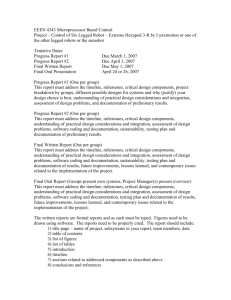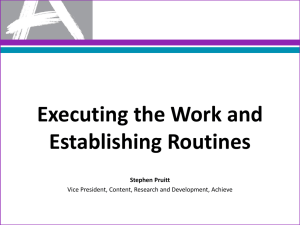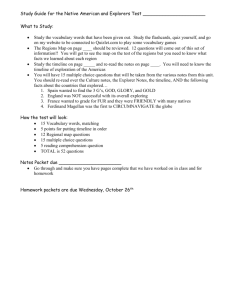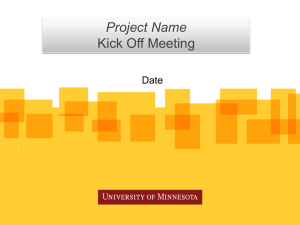Project Management
advertisement
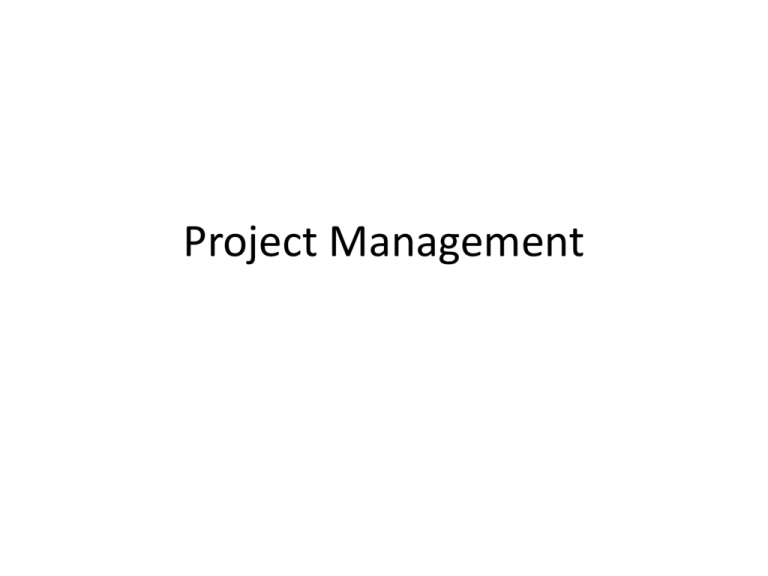
Project Management Main Phases of Project Development Project Management • Goals are not met if project is not managed • Simple but difficult – Tasks must be assigned – Time limits must be made, reviewed, and adjusted – Issues have to be confronted – Resources have to be allocated and monitored – Alternatives must be planned • Every member is responsible for project management Good Managers Continually Ask… Project Management Tools • • • • • • Team contract Mission/vision/goal statements Action register/Task list Meetings Project status reports Timelines/Schedule Action Register • All members must agree and understand actions • Must include Owner, Target Date, Completion Date • Keep actions SMART – – – – – Simple Measureable Action oriented Relevant Time based • Allocate action items equitably • Update comment each time item is reviewed – Progress/problems – Next steps – Alternatives • Review action items and adjust Meetings • • • • All team members must attend Set a day and time and stick to it Agenda is required prior to every meeting Every meeting starts with a review of action items and project schedule • Every meeting concludes with assignment of next action items and review of project status • Keep meeting minutes/notes on discussions Project Status Report • A tool to quickly and effectively communicate project status • Items to report – – – – – Schedule Budget Quality Team Dynamics Client Reactions • Additional items – Next milestones: from timeline – Issues: current problems – Risks: foreseeable problems Status Items to Report R Schedule X Y G Budget X Quality X Team Dynamics X Client Reactions X Next milestones: Complete prototype Issues: 8 week lead time on electrical parts. Risks: tolerance stack up might interfere with fit. STATUS REPORT RUBRIC TRACKED ITEM RED YELLOW GREEN Schedule Behind, missed deadline, no plan to make up time, schedule/timeline grossly inaccurate, no action items. Slipping, schedule/timeline does not exist or inaccurate, tasks are not being completed. On time, Schedule /timeline is accurate and project is tracking, tasks are being completed. Budget Over budget or budget does not exist, client has not been notified, major changes have driven cost up. Break even, Foreseeable expenses might be over budget, no practical alternatives. Under budget, All expenses and foreseeable expenses are accurate, alternatives are affordable. Quality Members disagree on approach and all solutions, client does not have confidence in team or disagrees with solution. Some members disagree on solution approach, client is unaware, some issues are missing and some have ill conceived solutions. All members and client support design and approach, all issues are identified with appropriate solutions. Team Dynamics No communication amongst members, client is in the dark, meetings are ignored, members are blaming and judging other members. Members are present but not engaged, client is not up-todate, members are taking on tasks individually without communicating to team Members are engaged, everyone knows what the mission and goals are, client knows what is going on, members are open with progress and tasks are shared. Client Reactions Client is in the dark, does not have confidence in outcome or team, is not contributing and/or not being contacted. Client is skeptical but supportive, does not understand direction, does not interact with team. Client is confident in team, provides support input and information, interacts regularly with team. Project Timeline/Schedule • Build timeline from start to end or end to start • Highlight milestones • Include dates, resources, owners, etc. • Identify series and parallel items • Identify key development areas, i.e. project learning, experimentation, prototyping, detail design, testing, etc. • Gantt Chart
